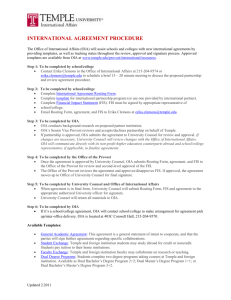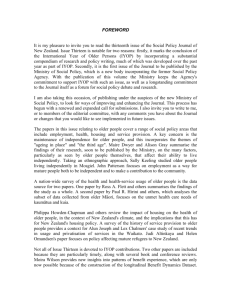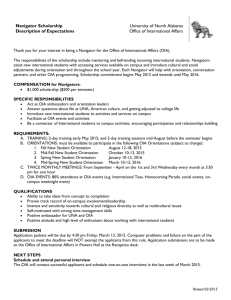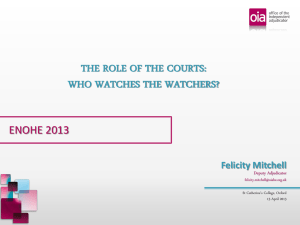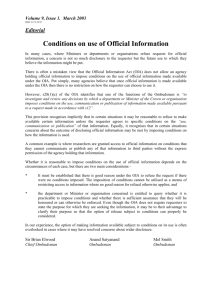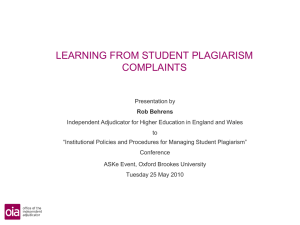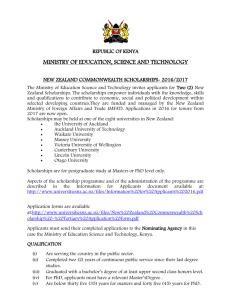OIA_Review_Project_Summary
advertisement
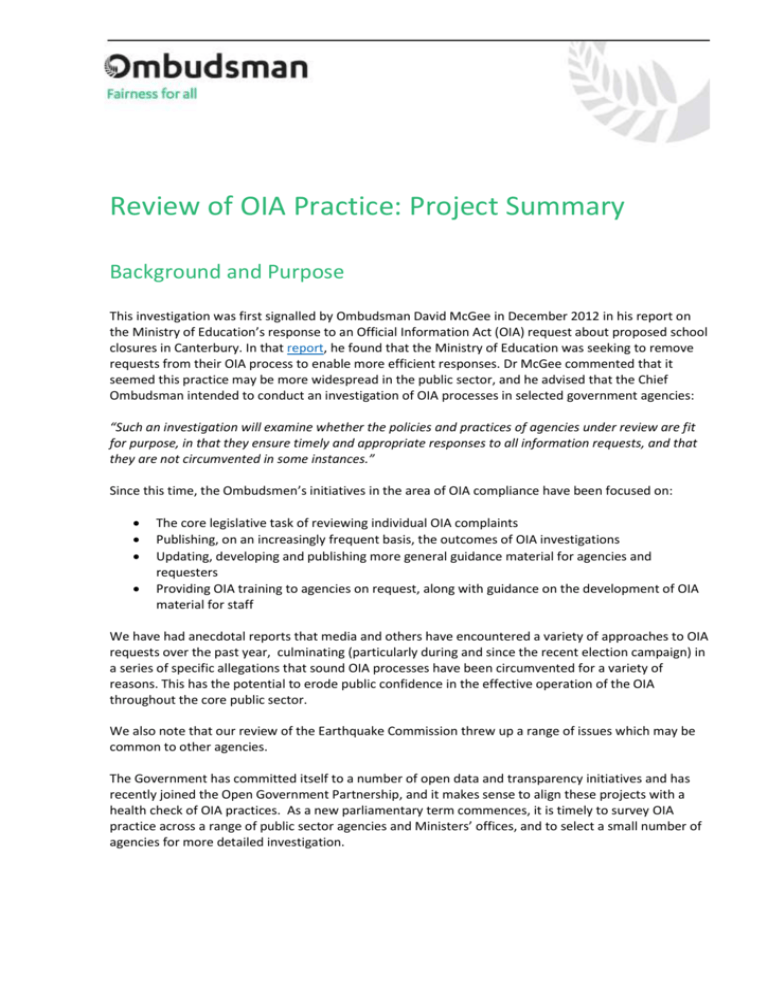
Review of OIA Practice: Project Summary Background and Purpose This investigation was first signalled by Ombudsman David McGee in December 2012 in his report on the Ministry of Education’s response to an Official Information Act (OIA) request about proposed school closures in Canterbury. In that report, he found that the Ministry of Education was seeking to remove requests from their OIA process to enable more efficient responses. Dr McGee commented that it seemed this practice may be more widespread in the public sector, and he advised that the Chief Ombudsman intended to conduct an investigation of OIA processes in selected government agencies: “Such an investigation will examine whether the policies and practices of agencies under review are fit for purpose, in that they ensure timely and appropriate responses to all information requests, and that they are not circumvented in some instances.” Since this time, the Ombudsmen’s initiatives in the area of OIA compliance have been focused on: The core legislative task of reviewing individual OIA complaints Publishing, on an increasingly frequent basis, the outcomes of OIA investigations Updating, developing and publishing more general guidance material for agencies and requesters Providing OIA training to agencies on request, along with guidance on the development of OIA material for staff We have had anecdotal reports that media and others have encountered a variety of approaches to OIA requests over the past year, culminating (particularly during and since the recent election campaign) in a series of specific allegations that sound OIA processes have been circumvented for a variety of reasons. This has the potential to erode public confidence in the effective operation of the OIA throughout the core public sector. We also note that our review of the Earthquake Commission threw up a range of issues which may be common to other agencies. The Government has committed itself to a number of open data and transparency initiatives and has recently joined the Open Government Partnership, and it makes sense to align these projects with a health check of OIA practices. As a new parliamentary term commences, it is timely to survey OIA practice across a range of public sector agencies and Ministers’ offices, and to select a small number of agencies for more detailed investigation. Office of the Ombudsman | Tari o te Kaitiaki Mana Tangata OIA Review: Project Summary Intended outcome The outcome we are seeking is improvement in the processing of OIA requests across the public sector (if and where deficiencies are found). This, coupled with increased transparency of agency OIA processes, should also foster greater public confidence in the effective operation of the OIA. In the course of the review we will obtain a detailed picture of OIA practice and compliance across a large number of core state sector agencies and Ministers’ offices. From that picture, we will be able to analyse the adequacy of OIA systems against best practice and make public recommendations for improvement. We will then be in a position to monitor implementation of the recommendations and assess improvements against the existing baseline. The Chief Ombudsman will also comment publicly on the concerns about OIA practice that have been raised in the media and online forums, and consider a programme for ongoing monitoring of OIA practice. Issues identified during the review will be highlighted in updates to Ombudsman guidance material and agency training. The review will be focused on issues of organisational policy and practice. If evidence emerges concerning specific examples of serious OIA breach, then a determination will be made in each case as to whether it can be addressed adequately within this inquiry, or whether a separate stand-alone investigation is warranted. Any process issues which can be resolved during the course of the review will be rectified immediately. Project components The proposal is for the project to have three components: Review of selected agencies’ OIA processes (12 agencies): Accident Compensation Corporation Department of Corrections Ministry of Education Ministry of Foreign Affairs and Trade Ministry of Health Ministry of Justice New Zealand Customs Service New Zealand Defence Force New Zealand Transport Agency Ministry of Social Development Ministry of Transport State Services Commission These agencies have been selected against the following criteria: Size of agency (FTEs) Number of OIA requests received per year (where data exists) Number of OIA complaints to the Ombudsman Number of OIA delay complaints upheld by the Ombudsman Page 2 of 7 Office of the Ombudsman | Tari o te Kaitiaki Mana Tangata OIA Review: Project Summary Length of time taken to respond to OIAs (where data exists) Broad coverage of the core public sector Inclusion of at least one agency that has been cited for embodying good OIA practice, as well as those cited for poor practice On the basis of these criteria, the Police would be a suitable candidate for review, but the Ombudsmen Act excludes Police from jurisdiction.1 In addition to completing the survey outlined below, the reviewed agencies will be subject to formal structured interviews of key staff, along with operational observation (Ombudsman staff observing practice and discussing procedure with the OIA team in the agency). Interviews will also be considered for members of associated Ministers’ offices, including political advisers. Survey (75 agencies plus 27 Ministers’ offices – listed in the Appendix): The intent of the survey is to gather data about OIA processes across a broad spectrum of state sector agencies and Ministers’ offices. This will allow us to gain a detailed overview of OIA practice within the core public sector, and provide additional context against which the Chief Ombudsman will assess the OIA practice of the agencies which are formally under review. The survey, which will be distributed in two parts, will include all national-level central government agencies subject to the OIA and against whom the Ombudsmen have ever received 10 or more OIA complaints (if the agency has existed for less than 5 years, then an average of at least 2 complaints per year of existence). It will also include the offices of all current Ministers. The survey will cover in detail the OIA policy, procedure and actual practice of organisations, along with OIA resourcing and staff training. It will also include questions on data collection, proactive release of official information, and records management practice. The 90 surveyed organisations which are not also subject to the formal review will be asked to complete the survey as third parties to an Ombudsmen Act investigation, pursuant to section 19 of that Act. Stakeholder engagement: We will be seeking broader input from current and former public servants, opposition parties, journalists, academic commentators, and other users of the OIA. This will comprise both general and targeted requests for submissions, interview invitations, and stakeholder forums. There will be a media release at the commencement of the project, and we will invite submissions from the public in the New Year. Confidentiality of information that identifies submitters will be guaranteed except where a submitter explicitly agrees to disclosure. 1 Technically, the Police are subject to the Ombudsmen Act, but the practical effect of section 13(7)(d) of that Act is to exclude Police from Ombudsmen Act investigation. Page 3 of 7 Office of the Ombudsman | Tari o te Kaitiaki Mana Tangata OIA Review: Project Summary Project Schedule The project will be commenced in December 2014 through formal notification to all agencies and offices which are subject to review or survey, and a general media release. Response to the survey will be due in the early part of 2015, and the review and stakeholder engagement components will follow in the first half of 2015. The Chief Ombudsman’s findings and recommendations will then be publicly reported. Page 4 of 7 Office of the Ombudsman | Tari o te Kaitiaki Mana Tangata OIA Review: Project Summary Appendix – Survey Agencies and Minister’s Offices Agencies Accident Compensation Corporation AgResearch Limited Airways Corporation of New Zealand Limited Arts Council of New Zealand Toi Aotearoa (Creative New Zealand) Broadcasting Commission (New Zealand on Air) Canterbury Earthquake Recovery Authority Children's Commissioner Civil Aviation Authority of New Zealand Commerce Commission Crown Law Office Department of Conservation Department of Corrections Department of Internal Affairs Department of Prime Minister and Cabinet Earthquake Commission Education Review Office Environmental Protection Authority Financial Markets Authority Government Communications Security Bureau Health and Disability Commissioner Heritage New Zealand Pouhere Taonga Housing New Zealand Corporation Human Rights Commission Inland Revenue Department Institute of Environmental Science and Research Limited KiwiRail Holdings Limited Land Information New Zealand Landcorp Farming Limited Law Commission Maritime New Zealand Ministry for Culture and Heritage Ministry for Primary Industries Ministry for the Environment Ministry of Business, Innovation and Employment Ministry of Defence Ministry of Education Page 5 of 7 Office of the Ombudsman | Tari o te Kaitiaki Mana Tangata OIA Review: Project Summary Ministry of Foreign Affairs and Trade Ministry of Health Ministry of Justice Ministry of Maori Development Ministry of Pacific Island Affairs Ministry of Social Development Ministry of Transport Ministry of Women's Affairs Museum of New Zealand Te Papa Tongarewa Board New Zealand Customs Service New Zealand Defence Force New Zealand Film Commission New Zealand Fire Service Commission New Zealand Institute for Plant and Food Research Limited New Zealand Lotteries Commission New Zealand Post Limited New Zealand Qualifications Authority New Zealand Security Intelligence Service New Zealand Transport Agency Pharmaceutical Management Agency Police Privacy Commissioner Public Trust Quotable Value Limited Radio New Zealand Limited Reserve Bank of New Zealand Serious Fraud Office Solid Energy New Zealand Limited Southern Response Earthquake Services Limited Sport New Zealand State Services Commission Statistics New Zealand Te Reo Whakapuaki Irirangi (Maori Broadcasting Funding Agency) Television New Zealand Limited Tertiary Education Commission Transport Accident Investigation Commission Transpower New Zealand Limited Treasury Worksafe New Zealand Ministers’ Offices Office of Rt Hon John Key Office of Hon Bill English Office of Hon Gerry Brownlee Page 6 of 7 Office of the Ombudsman | Tari o te Kaitiaki Mana Tangata OIA Review: Project Summary Office of Hon Steven Joyce Office of Hon Paula Bennett Office of Hon Dr Jonathan Coleman Office of Hon Amy Adams Office of Hon Chris Finlayson Office of Hon Simon Bridges Office of Hon Hekia Parata Office of Hon Anne Tolley Office of Hon Dr Nick Smith Office of Hon Murray McCully Office of Hon Nathan Guy Office of Hon Nikki Kaye Office of Hon Tim Groser Office of Hon Michael Woodhouse Office of Hon Todd McClay Office of Hon Peseta Sam Lotu-Iiga Office of Hon Maggie Barry Office of Hon Craig Foss Office of Hon Jo Goodhew Office of Hon Nicky Wagner Office of Hon Louise Upston Office of Hon Paul Goldsmith Office of Hon Peter Dunne Office of Hon Te Ururoa Flavell Page 7 of 7
